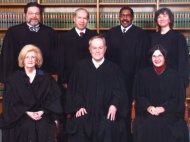7/31/2007
New Jersey Supreme Court Restricts Automobile SearchesThe New Jersey Supreme Court limits the ability of police to ask to search a disabled vehicle when there is no reason to suspect any wrong-doing.

The New Jersey Supreme Court yesterday upheld the principle that police cannot attempt to search an automobile without a "reasonable and articulable suspicion" that a crime has occurred. The high court applied this standard to a case where police coerced motorists stranded on the side of the road into allowing the search of their disabled vehicle.
On September 17, 2004 six individuals were traveling from New York to North Carolina in a Lincoln Towncar and a Honda Accord. At around 3am, the Towncar's gas tank came lose forcing the cars to stop on the shoulder of the New Jersey Turnpike near Edison Township. Two of the occupants were attempting to reattach the tank as two state troopers arrived on the scene.
Sergeant Ronald Klem looked at the motorists and told his partner, Trooper Sean O'Connor, "something wasn't right" because the motorists were not interested in their help. The troopers, however, never summoned roadside assistance despite seeing the damaged vehicle and just two minutes after arriving they started questioning each of the passengers separately on the side of the road. Within six minutes the troopers ordered the two motorists to stop fixing the Towncar and to line up on the highway guardrail. Questioning continued for more than an hour-and-a-half.
When motorist Christopher M. Leach stated that he wanted an attorney, Trooper O'Connor claimed not to hear him -- even though Leach's request "could be clearly heard on the videotape," according to the court. Instead, O'Connor yelled at Leach, "You will answer any questions" and told him not to give him "attitude." O'Connor proceeded to pressure Leach into signing a search consent form by surrounding him with troopers and claiming that dogs would search the car anyway without his consent. Once he signed the document, troopers discovered cocaine and marijuana under the car's hood and $11,000 in cash.
A trial judge ruled the search was illegal, saying it was unacceptable to think that "any time there is a loose part on a motor vehicle that somehow that should give rise to the belief that people are hiding drugs in the motor vehicle." The appeals court disagreed and overturned the decision, only to be reversed yesterday by the high court in a 6-1 ruling.
"Clearly, in the case of a disabled vehicle, if the police are fulfilling a community caretaking function, the consent search of a car for evidence of criminality is hardly in keeping with that mission," the supreme court opinion stated. "The driver of a disabled car facing police officers whose offer of assistance quickly turns into a 'fishing expedition' based on a 'hunch' that criminal activity is afoot is subject to no less compulsion to accede to a consent search than the driver subject to a typical motor vehicle stop."
The full text of the decision is available in an 85k PDF file at the source link below.


